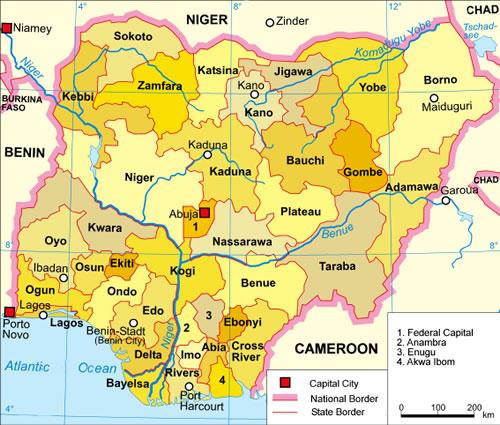Nigeria’s Economic Growth Outlook: Projections and Underlying Challenges
The African Development Bank (AfDB) has recently revised its forecast for Nigeria’s economic expansion, anticipating a slowdown with the country’s Gross Domestic Product (GDP) growth tapering to 3.2% by 2025. This projection reflects a complex mix of persistent economic headwinds confronting Africa’s largest economy, including surging inflation rates, currency instability, and the pressing need for comprehensive structural reforms.
These challenges have collectively dampened consumer confidence and restrained private sector investments—both vital drivers of economic momentum. The AfDB report underscores that without decisive policy action and collaborative efforts between government entities and private stakeholders, Nigeria risks stagnation in its growth trajectory.
Core Factors Shaping Nigeria’s Economic Path
- Escalating inflation: Persistent price increases are diminishing household purchasing power across urban and rural areas alike.
- Uncertain policy environment: Inconsistent regulatory frameworks continue to undermine investor confidence domestically and internationally.
- Dwindling oil revenues: As global energy markets fluctuate, Nigeria’s heavy reliance on oil exports exposes it to fiscal vulnerabilities amid volatile prices.
Strengthening Economic Resilience via Strategic Sector Investments
Navigating the anticipated GDP deceleration requires a holistic approach centered on structural transformation, prudent fiscal management, and targeted investments in high-potential sectors. Prioritizing infrastructure enhancement alongside human capital development will be critical in reversing current trends.
Sectors Poised to Propel Sustainable Growth
- Agriculture: Emphasizing climate-smart agriculture techniques coupled with modernized supply chain systems can boost productivity while ensuring food security. For instance, adopting precision farming technologies similar to those implemented in Kenya has shown promising yield improvements.
- Technology & Innovation: Expanding digital infrastructure by increasing broadband penetration and supporting tech incubators can accelerate the emergence of a vibrant digital economy that fosters entrepreneurship among youth demographics.
- Renewable Energy: Investing aggressively in solar, wind, and hydroelectric projects will reduce dependence on fossil fuels while addressing chronic power shortages that hamper industrial growth.
The role of public-private partnerships (PPPs) cannot be overstated; these collaborations have proven effective globally—for example, South Africa’s renewable energy independent power producer procurement program (REIPPPP)—in mobilizing capital efficiently while generating employment opportunities. Strengthening regulatory frameworks is equally essential to attract sustained foreign direct investment (FDI), diversifying revenue streams beyond hydrocarbons into manufacturing and services sectors as well.
| Sectors | Estimated GDP Contribution Potential (%) |
|---|---|
| Agriculture & Agribusiness | 15% |
| DIGITAL TECHNOLOGY & INNOVATION | 12% |
Investment Landscape & Policy Reform Priorities Moving Forward
Nigeria stands at an inflection point where recalibrated strategies from both governmental bodies and private investors are imperative amid the projected GDP moderation to 3.2%. Emerging opportunities abound particularly within renewable energy projects aimed at achieving net-zero targets aligned with global climate commitments; agricultural modernization initiatives responding to rising food demand; as well as technology-driven enterprises fostering innovation ecosystems across urban centers like Lagos or Abuja.
The government must focus on creating an enabling environment through reforms targeting key bottlenecks such as inadequate transport networks—which currently increase logistics costs—and cumbersome bureaucratic procedures hindering business operations. Key reform areas include:
- < strong >Infrastructure Upgrades: strong > Accelerate development of roads , railways , reliable electricity grids ,and nationwide digital connectivity . li >
- < strong >Regulatory Simplification: strong > Streamline licensing processes , enhance transparency ,and enforce property rights protections . li >
- < strong >Public-Private Synergies: strong > Foster collaboration models that leverage private sector efficiency alongside public oversight for impactful project delivery . li >
Through these concerted efforts focused on diversification away from oil dependency toward knowledge-based industries combined with sustainable resource management practices , Nigeria can position itself competitively within regional markets such as ECOWAS while attracting long-term international capital inflows . This strategic pivot is crucial not only for stabilizing short-term macroeconomic indicators but also securing inclusive prosperity over decades ahead .
Conclusion: Charting a Course Toward Sustainable Economic Advancement in Nigeria
The African Development Bank’s forecast signaling slower GDP growth at 3.2% by 2025 serves both as a cautionary note about existing vulnerabilities within Nigeria’s economy—and an impetus for transformative change. Addressing inflationary pressures alongside enhancing governance structures will be pivotal steps toward restoring investor trust while stimulating domestic enterprise activity.< / p >
Nigeria’s future hinges upon deliberate policy choices emphasizing diversification through innovation-led sectors supported by robust infrastructure investments—mirroring successful models seen elsewhere across emerging economies like Vietnam or Indonesia.< / p >
If policymakers act decisively now—embracing reform agendas that promote transparency, foster entrepreneurship,and strengthen public-private cooperation—the nation can overcome present obstacles.The journey may present complexities,but resilience combined with strategic foresight offers promising prospects for sustained economic vitality.< / p >
< / article >
